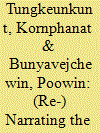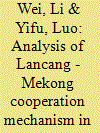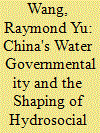| Srl | Item |
| 1 |
ID:
188849


|
|
|
|
|
| Summary/Abstract |
The launch of the Lancang-Mekong Cooperation (LMC) opened a fresh chapter in international politics in the Mekong region, by marking China’s official entry into the continental Southeast Asian arena. However, little is known about the LMC’s evolution. By extensively relying on the recently opened Archives in Bangkok, this article illuminates facts and narrates the LMC’s formation, with special emphasis on the Chinese perspective. It argues that, similar to Chinese-led regional multilaterals elsewhere, the LMC is a spoke of the continent-wide Belt and Road Initiative (BRI), and functions as a mini-BRI architecture in the Mekong region.
|
|
|
|
|
|
|
|
|
|
|
|
|
|
|
|
| 2 |
ID:
170867


|
|
|
| 3 |
ID:
189506


|
|
|
|
|
| Summary/Abstract |
This paper examines China's water governmentality in advancing the Lancang-Mekong Cooperation (LMC). It attends to how discourses, used as a political instrument, are framed, justified and contested in the reshaping of international hydrosocial territories. China's official and popular discourses present the LMC as promoting multilateral politics, economic benefits and social integration, while they obscure polarizing politics, external interventions and regional conflicts. Using strategies of positive publicity first, top-down communication and mutual empathy creation, these discourses aim to deflect attention away from controversies and geopolitics in the region to construct governable hydrosocial territories. However, in a transnational context where the Chinese state cannot unilaterally control geographical imaginaries, alternative discourses depict China as a “hydro-hegemon” that poses threats to downstream countries. The discursive dichotomy reflects multiple ontologies of water and power struggles in international river governance, bringing regional stability and sustainable development into question.
|
|
|
|
|
|
|
|
|
|
|
|
|
|
|
|